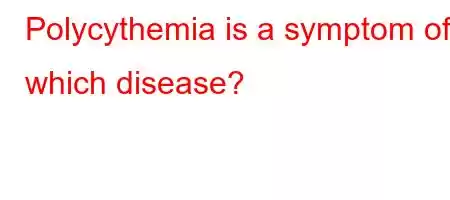Blog Polycythemia is a symptom of which disease?
Polycythemia is a symptom of what disease?
Polycythemia vera is a rare type of blood cancer in which your bone marrow produces too many red blood cells….Common symptoms of polycythemia vera include:
Fatigue. Itching Shortness of breath when lying down Difficulty concentrating. Unplanned weight loss Abdominal pain Feeling full easily, bloated. Blurred or double vision.What is Stress Polycythemia?
There is another cause of relative polycythemia. It can be seen in some excited people, in some pain and sudden exercise situations, as well as in the case of excessive red blood cell delivery, such as contraction of the spleen. this is also called stress polycythemia. This condition is also called Gaisböck's syndrome.
How is polycythemia treated?
The basic approach in the treatment of polycythemia is to restore the fluidity of the blood by bringing the blood level back to normal. For this purpose, blood is taken from the patient at regular intervals, just like in blood donation, with the method called "phlebotomy". This blood taken is not used by anyone else. Anticoagulants are given.
What causes polycythemia in the newborn?
In some newborn babies, such as intrauterine hypoxia, maternal diabetes, preeclampsia, chromosomal diseases, smoking of the mother during pregnancy and problems in clamping the umbilical cord after delivery. There are situations that pose a risk for polycythemia.
In which diseases is phlebotomy used?
Phlebotomy is the procedure of taking blood from a vein. Phlebotomy, which is a method used during blood donation to the blood bank; It is also applied in the treatment of different diseases (such as heart failure, pulmonary edema) with the aim of removing excess blood that is burdening the blood circulation.
Which doctor to go to for polycythemia?
Treatment. A hematologist (a doctor who specializes in blood diseases) can recommend specific treatment for a patient with polycythemia vera. PV is a chronic disease; It does not heal, but it can be effectively treated for long periods of time.
How to detect excess blood?
Searching for the symptoms of excess blood, Gemici said: headache, dizziness, tinnitus, visual disturbances, spleen enlargement. pain in the upper left side of the abdomen, feeling of early satiety, bleeding, weakness, weight loss, high blood pressure, red face, excessive desire to sleep, itching especially after a hot bath, finger …
Polycythemia What is a newborn?< /strong>
Polycythemia, which expresses an increase in erythrocyte mass in newborn babies, is a clinical condition that particularly affects the central nervous system, as well as the circulatory and gastrointestinal systems.
Read: 195


